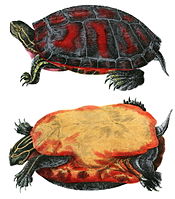Ouachita map turtle
| Ouachita map turtle | |
|---|---|

| |
| Scientific classification | |
| Domain: | Eukaryota |
| Kingdom: | Animalia |
| Phylum: | Chordata |
| Class: | Reptilia |
| Order: | Testudines |
| Suborder: | Cryptodira |
| Superfamily: | Testudinoidea |
| Family: | Emydidae |
| Genus: | Graptemys |
| Species: | G. ouachitensis
|
| Binomial name | |
| Graptemys ouachitensis Cagle, 1953
| |
The Ouachita map turtle (Graptemys ouachitensis) is a species of turtle belonging to the family Emydidae.
Subspecies
[edit]Subspecies include:[2]
In recent years the Sabine map turtle (Graptemys ouachitensis sabinensis) has been recognized by many as a full species Sabine map turtle (Graptemys sabinensis).[3][4][5]
Distribution
[edit]This species is endemic to the United States. It can be found in Texas, Louisiana, Mississippi, Alabama, Oklahoma, Kansas, Arkansas, Missouri, Iowa, Minnesota, Wisconsin, Indiana, Ohio, West Virginia, Illinois, Tennessee and Kentucky.[2] G. o. sabinensis exists only in the Sabine River of Louisiana and Texas. Both G. o. ouachitensis and G. o. sabinensis are freshwater riverine turtles. The G. o. ouachitensis is rarely seen on land unless it is nesting season or it is basking. [6]
Description
[edit]This species' carapace features a row of low vertebral spines, and is serrated on the posterior rim. The carapace is olive, dark brown, or black in coloration with light yellowish markings with dark borders. The plastron color varies from cream to yellow and is patterned with dark lines and swirls. The body color is grayish brown to blackish and is marked with yellowish stripes.[2]
On the head, it has light yellow spots: a rectangular one behind each eye, an oval under each eye, and a round one on each side of the jaw. In some specimens, the spot behind and the spot under the eye can combine to form a single thick "C" stain. The eye has a black stripe in the middle.[2]
Males are significantly smaller than females. The males can grow to be as large as 5 in (12 cm) in carapace length. The females can grow to be up to 10 in (25 cm) in carapace length.[2]
Natural history
[edit]Hatchlings of this species have recently been found to make sounds prior to exiting the nest. These are mostly "clicking" noises, but more tonal "mewing" sounds are also sometimes present. These sounds are the first documented for any North American hatchling turtle. (Geller, G.A. and G.S. Casper. 2019. Late-term embryos and hatchlings of Ouachita Map Turtles (Graptemys ouachitensis) make sounds within the nest. Herpetological Review 50:449-452)
Diet
[edit]Ouachita map turtles feed mainly on small aquatic animals such as shrimp, insects (such as mayflies, caddisflies, beetles, grasshoppers, fly larvae, and midge larvae), molluscs, fish, and fish carrion.[7] They also consume algae and aquatic plants (such as pondweed, duckweed, and manna grass).[8]
Pet trade
[edit]As they are small, Ouachita map turtles are common among turtle keepers. They can be kept with most other species and can be raised on specialty pellets and dried shrimp. Although they need heat and ultraviolet light (UVB),
Gallery
[edit]-
Juvenile Graptemys ouachitensis. Close-up
-
A specimen from Missouri
-
Range map of the Ouachita map turtle
-
Sabine map turtle (Graptemys sabinensis) Orange Co. Texas.
References
[edit]- ^ IUCN (2016). "Graptemys ouachitensis". IUCN Red List of Threatened Species. 2016. Retrieved 7 December 2016.
- ^ a b c d e "Tortoise and Freshwater Turtle Specialist Group". Archived from the original on 20 September 2019. Retrieved 28 January 2019.
- ^ Lindeman, P. V. 2013. The Map Turtle and Sawback Atlas: Ecology, Evolution, Distribution, and Conservation. University of Oklahoma Press, Norman. 460 pp. ISBN 978-0-8061-4406-1
- ^ Uetz, P., Freed, P. & Hošek, J. (eds.) (2019) The Reptile Database, http://www.reptile-database.org, accessed 30 January 2020
- ^ Crother et al. (editors) 2017. Scientific and Standard English names of amphibians and reptiles of North America north of Mexico, with comment regarding confidence in our understanding, eight edition. Society for the Study of Amphibians and Reptiles, Herpetological Circular No. 43. 102 pp. [Official Names List of American Society of Ichthyologists and Herpetologists; Canadian Herpetological Society; Partners in Amphibian and Reptile Conservation; Society for the Study of Amphibians and Reptiles; The Herpetologists' League. Also accessible at: https://ssarherps.org/wp-content/uploads/2017/10/8th-Ed-2017-Scientific-and-Standard-English-Names.pdf accessed 30 January 2020
- ^ Brown, Ashley D.; Temple-Miller, Kathleen; Roosenburg, Willem M.; White, Matthew M. (27 June 2012). "Mitochondrial DNA Variation in the Ouachita Map Turtle". Copeia. 2012 (2): 301–306. doi:10.1643/CH-11-009. ISSN 0045-8511. S2CID 85651342.
- ^ "Graptemys ouachitensis (Ouachita Map Turtle)". Animal Diversity Web.
- ^ "Graptemys ouachitensis (Ouachita Map Turtle)". Animal Diversity Web.
Further reading
[edit]- Cagle, F.R. 1953. Two New Subspecies of Graptemys pseudogeographica. Occ. Papers Mus. Zool. Univ. Michigan (546): 1-17. ("Graptemys pseudogeographica sabinensis, new subspecies", pp. 2–10; and "Graptemys pseudogeographica ouachitensis, new subspecies", pp. 10–16.)
- Conant, R. 1975. A Field Guide to Reptiles and Amphibians of Eastern and Central North America, Second Edition. Houghton Mifflin. Boston. xviii + 429 pp. + 48 Plates. ISBN 0-395-19979-4 (hardcover), ISBN 0-395-19977-8 (paperback). (Graptemys pseudogeographica ouachitensis and G. p. sabinensis, pp. 57–58, Figure 10. + Plate 8 + Map 14.)
- Lindeman, P.V. 2013. The Map Turtle and Sawback Atlas: Ecology, Evolution, Distribution, and Conservation. University of Oklahoma Press. Norman. 460 pp.
- Smith, H.M., and E.D. Brodie, Jr. 1982. Reptiles of North America: A Guide to Field Identification. Golden Press. New York. 240 pp. ISBN 0-307-13666-3 (paperback). (Graptemys ouachitensis ouachitensis and G. o. sabinensis, pp. 50–51.)
External links
[edit]- Ouachita Map Turtle, Reptiles and Amphibians of Iowa
- Graptemys ouachitensis, Illinois Natural History Survey
- Ouachita Map Turtle, Missouri Department of Conservation
- The Reptile Database






